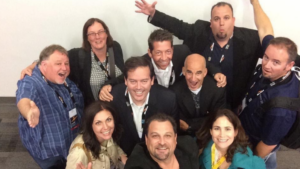What does it take to become a great public speaker?
I’m sure you’ve asked yourself this question at some point in your career or even at school too. It might have been in a less eloquent format before a nerve-wracking talk, raising your hands aloft and asking ‘howwww?!?!’
Public speaking can strike fear into the heart of many mere mortals and it’s one of the most common, widely held phobias out there.
It’s often the case that one bad public speaking experience when you’re younger, inexperienced and your style probably isn’t polished, can put you off for life.
After speaking around the world and being a TED speaker, I know a fair bit about what does and doesn’t work in public speaking. I can’t give you a magic tip that’ll eradicate your nerves (apart from imagining everyone in the room is naked, of course!) but there are a few super important and simple steps you can take before you speak that should lay the foundations for a good talk.
The truth is that public speaking is an art and a science and there are principles that you can master before you go out there and speak.
Know your Brand or no-one else will
Building your own personal brand is easy to forget amongst the rest of your responsibilities, but being able to market yourself is more straight-forward if you can nail down your USPs, objectives and present them in a unique way that does your personality justice. Your personality is one of your most marketable assets. Sometimes it’s not what you say, it’s how you say it.
[Tweet “Your personality is one of your most marketable assets. @bryankramer”]
Be authentic, consistent and research trends and developments to help strengthen your personal brand with valuable insight. This way, people will come to you and ask you to speak because of your distinctiveness or something unique you bring to the table.
Kare Anderson has just reached over 2 million views for one of her TED talks about opportunity making. Her talk’s a great example of using a particular trait or personality type such as shyness/introversion to introduce a concept, tell her story and build her expertise and personal brand around it. She’s combined shyness with real-world, actionable advice and become an authentic, authority figure on the subject.
 Throw your ego out the door
Throw your ego out the door
Everyone is looking at you while you’re talking, but don’t go power crazy about it. There’s definitely room for a bit of ego in public speaking, but we’ll call it confidence instead.
Arrogance is a no-no though and you can lose your audience if you market yourself as a complete douchebag.
Knowing your subject inside out and being authentic will shine through when you speak, so you don’t need to add a giant dollop of ego into the mix. Ego is often about emphasizing how great you are, but if your talk is humble, engaging and interesting people will think that anyway, without needing an ego waved in their face.
Really understanding your content by creating it first
Obviously, there’s room for a bit of spontaneity and improvisation in your talks. We’re not talking juggling or fire-breathing, but some humor or re-jigging of your content. Being prepared and creating your content beforehand means that you can become an expert in your public speaking talk. No-one is going to know your talk better than you and you’re the authority on whatever content you’ve created to use in your speaking gig.
Creating your content and weaving your unique insight and analysis into your talk allows you re-package a subject into your own understandable terms, so it’s easier for you to communicate to your audience.
Chimamanda Ngozi Adichie is an amazing storyteller and novelist who uses her own experiences and authentic cultural voice to communicate wider issues about inequality. Her content is so personal and connected to her. It can be tempting to re-hash old arguments in your talks, but your own perspective is just as valuable.
Highlighting and learning from others before you
Watching how other effective public speakers perform and spotting similarities between speakers is a great way to perfect your technique. Learning from others is an essential part of getting better at something…anything, even learning itself. There will always be ways that you can improve your public speaking style.
There’s heaps of advice out there to do with body language too, as 60% of our communication is through our body, voice tone and facial expressions.
A good place to start is picking someone that has a similar style to you or a style that’s similar to what you want to achieve in your talks. Then you can take the best elements and try to weave them into your own public speaking style.
But you can also learn from people that cover a completely different subject to your own or deliver it in an alternative style to pick up tips you might not have thought about before.
If you watch a talk about a subject you have no idea about or prior knowledge, you can take note of what it is about that speaker that helps you to understand a new topic…or not as the case may be.
Practice and you’ll Progress
Rome wasn’t built in a day and you won’t be an amazing public speaker in 24 hours either…unless you’re secretly Barack Obama. Practice, practice, practice and that means saying ‘yes’ to every public speaking engagement you’re offered in the early days.
You can read and watch all you want, but you’ll truly learn and improve by actually going out there and speaking.
[Tweet “You can read and watch all you want, but you’ll truly improve by going out and speaking.”]
You might feel inexperienced or nervous and that’s okay, but think how much better you’ll feel for getting through a talk and learning some lessons from it. As I said, there are no magical, mystical solutions, you’ve just got to pull your socks up, dust yourself down and go out there and speak. What’s the worst that can happen? (don’t dwell on this for longer than 3 seconds!)
Anyway, you’ve got this – go and spread your message!

 Throw your ego out the door
Throw your ego out the door



